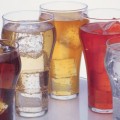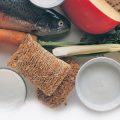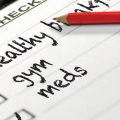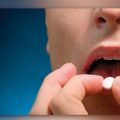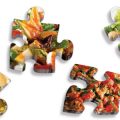Food, Medicine & Diabetes Quiz
By Linda Bernstein, PharmD
When you have diabetes, it is especially important to sort out fact from fiction when it comes to the foods you eat and the medicines you take. What and when you eat or drink can affect your blood glucose-lowering medicines, and this can impact the other medicines you take. So let’s see how well you do in the following quiz.
TRUE OR FALSE? Medicines that lower my blood glucose can be crushed and mixed with applesauce to ease swallowing.
FALSE. The general rule is do not crush or chew medicine or take capsules apart and stir them into food unless your physician or pharmacist has OK’ed it. This is particularly true if the medicine is a long-acting product, such as extended-release glipizide or metformin. Tablets that are sustained-, extended- or delayed-release should not be crushed or chewed. Similarly, capsules containing medicines with long-acting properties should not be opened and sprinkled over food, since they are designed to be released over an extended period of time. If you break the coating on an extended-release pill by crushing or chewing it or if you let out all the timed-release pellets in a capsule, you are essentially releasing all of the active product at once, which could cause an overdose of the medicine. If you have trouble swallowing medicines, ask your pharmacist about other dosage forms, such as liquids, or other pills that are easier to swallow.
TRUE OR FALSE? It is best to eat regular meals and avoid skipping a meal when taking medicines that lower my blood glucose.
TRUE. When it comes to medicines that lower your blood glucose, whether they’re oral pills, insulin or other injectable medicines, it is best to keep your meal times as regularly scheduled as possible. If you take your medicine and do not eat, it could lead to hypoglycemia, or low blood glucose. On the other hand, if you skip your medicine and eat a meal, you may experience hyperglycemia, or high blood glucose. Our busy lifestyles often make it impossible to achieve a perfect medication-meal schedule. Your diabetes care team, with the help of regular blood glucose monitoring, will help you find the correct balance of medicine, food and exercise to keep your blood glucose in your target range. With careful planning, you should be able to build some flexibility in to your diabetes regimen without sacrificing good management.
TRUE OR FALSE? Medicines that lower my blood glucose can be taken without regard to meal times.
FALSE. Some medicines that lower your blood glucose can be taken without regard to meals but many others cannot. Here’s why: Medicines that lower your blood glucose—whether they are oral pills, insulin or other injectable medicines—work in different ways to manage your blood glucose throughout the day. They have different onsets of action, times to reach peak effect and/or durations of effect. You need to find out how your particular medicines work best for you. Following are some important questions you can ask your health care provider and pharmacist about your medication regimen and meals to ensure its effectiveness and safety:
» How many times a day should I take my medicine?
» Should my dose vary depending upon how much food I eat and my exercise level?
» When is the best time to take my medicine: before meals (how long before), at the first bite of food, anytime during or right after a meal or snack? Between meals?
» Which meals should I take it with: breakfast, lunch, dinner and/or snack times?
» Should my medicine be taken at the same time each day?
» What should I do if I skip a meal or eat later?
» How does taking a combination medicine affect the timing and frequency of my dosing regimen?
» Should I still eat my next meal if I forgot to take my medicine?
» May I take my medicine with food to reduce stomach upset?
» Is it best to eat three large meals or five to six small meals each day?
» Is it safe to drink alcohol? If so, how much?
TRUE OR FALSE? It is best to drink water when swallowing oral medicines that lower my blood glucose.
TRUE. Unless directed otherwise, you should take oral medicines that lower your blood glucose with at least one full glass (8 ounces) of plain water. Water helps dissolve the medicine and helps get it into the bloodstream so it can take effect. Do not mix your medicine into hot drinks. Be aware that alcohol can increase your risk of hypoglycemia when you take medicines that lower your blood glucose, can cause a flushing reaction with some of these medicines and can contribute to other side effects with others. Avoid other beverages to wash down your medicines such as juices, milk and soda. These drinks can increase your blood glucose and can interact with some medicines. For example, milk reduces the effect of certain antibiotics. Grapefruit juice can result in higher drug blood levels with greater potential for side effects in some cases. Soft drinks or flavored beverages with high fructose corn syrup and other sweeteners also can increase blood glucose.
These are just a few of the important issues that come into play regarding food, medicine and diabetes. If you have any questions about your medicines, you can turn to your health care provider and pharmacist for helpful answers.



